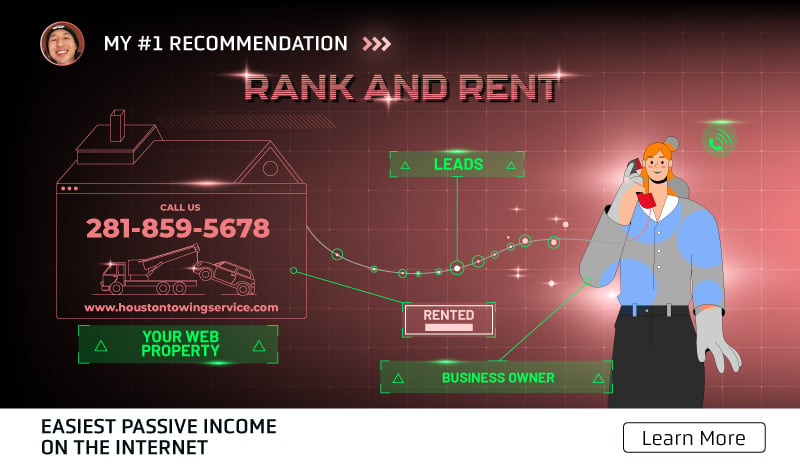How To Become a Digital Landlord | 3 Ways To Make Money

How to become a digital landlord:
- Learn SEO.
- Choose a niche to target.
- Find an opportunity to rank a website.
- Set up a digital property.
- Implement SEO to generate traffic.
- Collect leads.
- Monetize the digital real estate.
- Scale by investing in additional units.
Being a digital landlord means owning digital properties like websites, social media accounts, or pieces of a metaverse project like The Sandbox. I focus on websites in this article. Specifically, using the local lead generation digital real estate business model.
You can make money being a digital landlord. You can make money as a digital landlord through methods like lead generation, affiliate marketing, Ecommerce, and allowing paid ads to run on your website. A digital landlord’s salary typically ranges between $50K - $100K per year. However, many digital landlords surpass these modest figures.
James Dooley, owner of FatRank and PromoSEO, is a wildly successful digital landlord. Also known as the “$100 Million SEO”, James has a digital real estate portfolio of over 650 websites. These websites find and sell leads to business owners across the United Kingdom.

You need $500 to $1,000 to start as a digital landlord. This amount should cover startup costs like website domain, hosting, and some SEO tools and services. I’ve been a digital landlord for over a decade already. In the following article, I’ll show you how to get started and discuss some ways you can make money with your digital properties.
1. Learn SEO
Take a course like Dan Klein’s Job Killing program to learn how to rank a website on the first page of Google with SEO. SEO is the foundation of digital real estate. SEO, or search engine optimization, is a set of processes for achieving maximum visibility in the search engine.
The majority 68% of all online experiences begin with a search engine and Google controls nearly 90% of the search engine market, according to Statista’s data. As such, websites that are easily found on Google are highly valuable because many people use search and most people use Google to find what they are looking for.
The 4 pillars of SEO to learn are:
- On-page SEO - Optimizing individual web pages (Ex: keywords in title tags & meta descriptions)
- Off-page SEO - Activities beyond the website that impact rankings (Ex: link building and citations)
- Technical SEO - Optimizing technical aspects of a website (Ex: website speed & user experience)
- Local SEO - Optimizing a brand’s ability to appear in local search results (Ex: Google My Business profile management & Google Reviews)
2. Choose a Niche To Target
Before you can create a valuable digital property, you need to establish your target audience. This is accomplished by specifying a niche. A niche is just a small segment of a larger market. Choosing a specific niche increases your success rate by lowering the competition. It also enables you to create clear messaging to attract your intended audience.
Some questions to ask when choosing a digital real estate niche include:
- Is it phone generated? - Phone generated services are services where the customer usually calls to inquire about the work. Phone generated services are optimal for digital real estate because customers call the business rather than going to the business location. That means you can receive these phone calls and sell them to relevant businesses as leads.
- Does it require licensing? Avoid potential legal issues and unnecessary hurdles by steering clear of licensed professions, like pest control. Many jurisdictions require licensing information to be shown directly on the website and marketing materials. Google supports this by heavily scrutinizing digital assets in niches where licensing is required.
- How profitable is it? Niches with higher average profit can afford to compensate you more for your leads. For example, the average roofing job in the US costs $5,866 to $13,209, according to Angi. Data from Angi also shows that most people spend between $966 to $3,076 to repaint their home interior. As such, a roofing gig is worth much more than a painting job, so the value of a roofing lead is typically higher.
We outline tons of tried-and-tested niches for students in our digital landlord program. Some of the best niches to target for a digital landlord include:
- Concrete
- Decks
- Fencing
- Drywall
- Flooring
- Gutters
3. Find an Opportunity To Rank a Website
Perform research to find a Google SERP where the competition looks low and the search interest is relatively solid. When generating leads for the local lead generation business model, this means a location and niche keyword variation. For example, “Dallas plumber”.
Start by researching potential cities to target. The optimal range for low competition cities is a population between approximately 100K - 300K. It’s possible to create digital real estate for cities outside of this range. However, cities with populations below 100K typically have lower income potential and cities above 300K have high competition. If targeting the US, there are a few places you can pull a list of US cities by population online, including from Wikipedia.
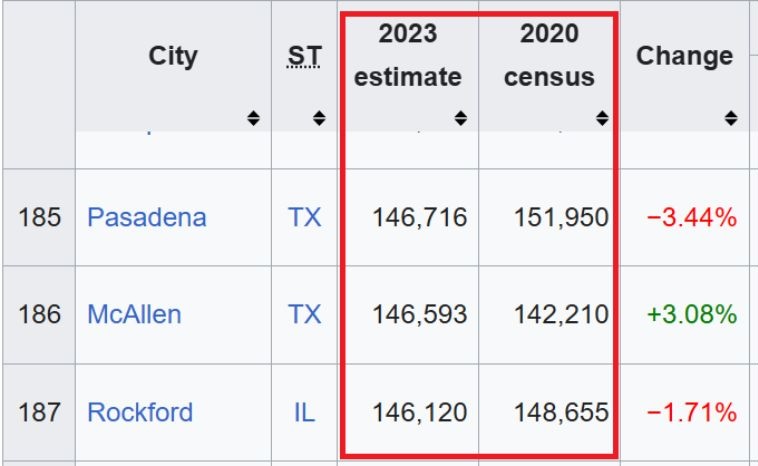
Check Google SERPs by searching your different locations with your niche. Analyze the SERPs to look for signs of weakness. One strategy we teach in our rank and rent program is to look at the number of reviews for businesses showing up in the Google Map pack. If most of the businesses showing up here only have single or double digit review counts, it’s a positive sign you will be able to rank without investing too many resources.
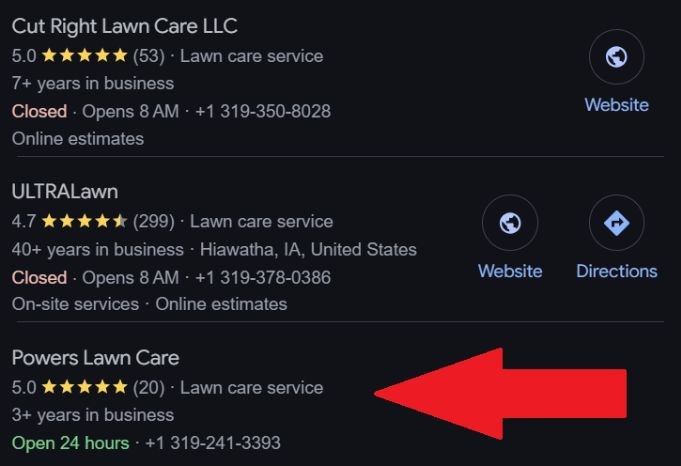
Verify there are enough businesses who would be interested in receiving leads. If there are only 5 businesses or fewer from your niche in a location, it’s probably not a good opportunity. More businesses operating in a location shows that there is solid demand for a service in that location. It indicates that you can generate enough leads to make the venture worthwhile. Furthermore, you will need to find a business owner to pay you for access to your leads. More businesses means more potential prospects to rent your digital real estate to.
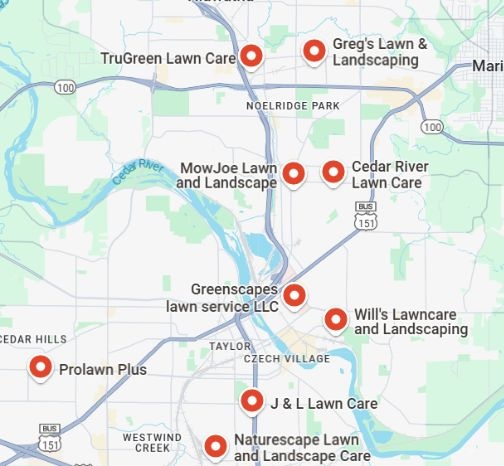
SEO tools like Ahrefs can help validate keyword ideas by estimating the number of monthly searches. However, these tools aren’t 100% accurate. There may be search interest that these tools aren’t picking up. Many digital landlords find great opportunities for search queries that SEO tools estimate as 0 volume.

4. Set Up a Digital Property
Once you have a keyword variation to target that includes a niche with a location, create a new website. When creating a new website, the first step is to purchase a domain name. You can search for and purchase a domain name through a domain registrar service, such as Namecheap. Most digital landlords recommend choosing a .com domain name because people tend to have higher trust for these domains.

Some people recommend trying to obtain an exact match domain (EMD), where the keyword is in the domain. For instance, if you’re trying to rank for the keyword Los Angeles roofer, an EMD would be losangelesroofer.com. Although this can help you rank faster by tricking Google into thinking people are looking up your brand name, you still need a solid SEO strategy to win. As such, choosing an EMD comes down to preference because a non-exact match domain with solid SEO will easily outrank an exact match domain with poor SEO long term.
Next, purchase web hosting for your website. Web hosting makes your website viewable online so people can find it. Popular web hosting service providers include Hostinger, Bluehost, SiteGround, and GoDaddy. If you buy your domain name from a different service provider than your web hosting, you need to set up custom DNS. Custom Domain Name System (DNS) allows you to point your domain name at the correct web hosting service. If you don’t do this, users will get an error message when searching for your website. Here is an example of a customer DNS on Namecheap pointing a domain to SiteGround web hosting.

Now, choose a content management system (CMS). A CMS allows you to manage digital files without needing to write code yourself. The most popular include WordPress, Shopify, Wix, and Squarespace. Although these are good options, I recommend digital landlords use Snapps.ai .
Snapps is a drag-and-drop website builder that makes creating websites fast and easy. A subscription includes ultra fast web hosting through Amazon Web Services (AWS) and you can purchase your domain directly through the platform. As such, you can manage your website configuration all in one place. With Snapps, simply choose a template and start building your website. Or, have AI generate a website for you.
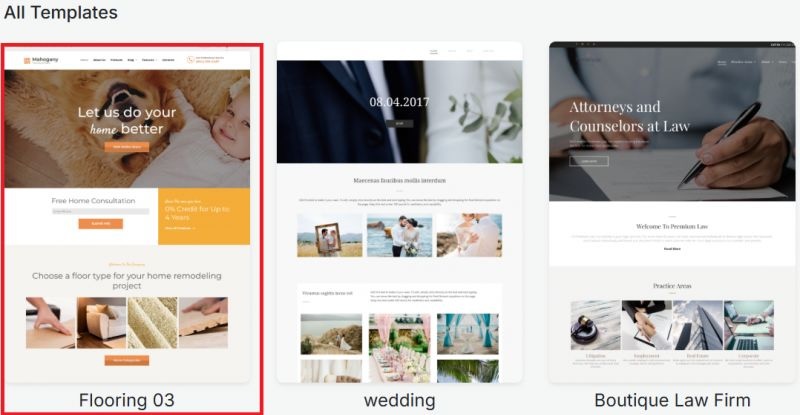
5. Implement SEO To Generate Traffic
You should start doing SEO from the very first content you put on your website. Although we teach advanced strategies for ranking websites on Google in our course, I’ll run you through the basic steps here.
The first thing is to make sure you have your target keyword in your website title tag.

In terms of website content, research the website content your competitors are ranking with on the first page of Google. See what service pages they have and common keywords they incorporate throughout their content. Look at how many headers they use and the contents of those headers on each page. This information should provide you with a solid starting point for your own website content.
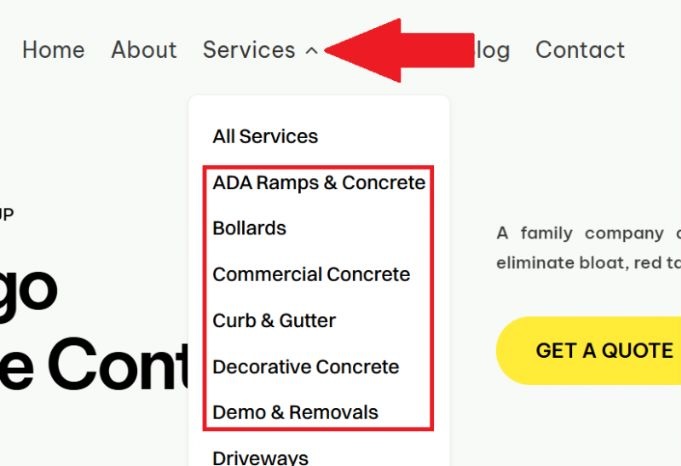
Once you’ve finished your on-page SEO, expand your efforts to off page SEO tactics. Link building is one of the most effective SEO strategies. Link building entails getting more external websites to link to your website in their content. This shows Google other websites find your website credible, so the search engine algorithm is more likely to rank your website higher.
Backlinks can be tricky to acquire. In a perfect world, websites get backlinks by posting high-quality content. This is how it worked before. These days, website owners need to use more creative tactics to get backlinks. One option is to reach out to relevant website owners in your niche or location to offer payment for a backlink. Another option is to just purchase backlinks from a reputable link vendor.
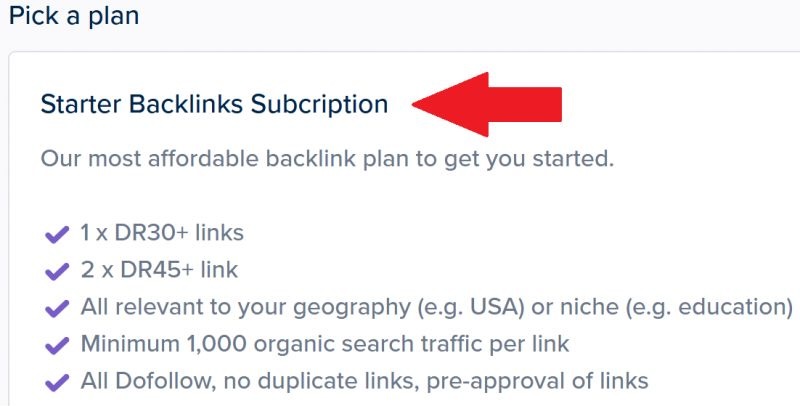
Many digital landlords take off page SEO a step further by setting up a Google Business profile and social media accounts alongside the website.
6. Collect Leads
Set up a website form and call tracking number so website visitors leave their information. SEO gets traffic to your website, while forms and call tracking phone numbers convert that traffic into real leads.
Use the website form to collect relevant information like contact name, phone number, email, and project details.
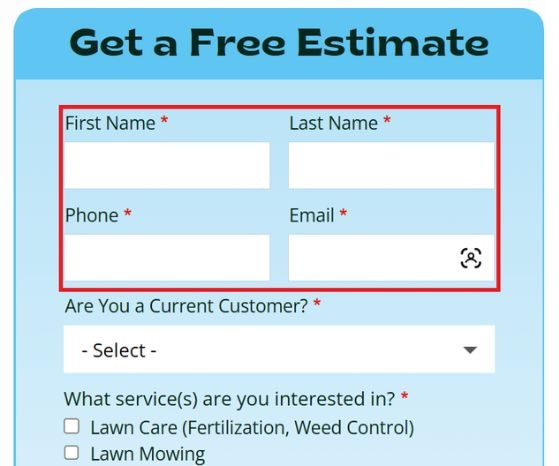
A call tracking phone number is a special phone number you can buy for a few dollars a month that allows you to record data and redirect calls. Callsling is the best call tracking number provider for the digital landlord business model. Purchase a call tracking number and place it at the top of your website’s homepage.

You can configure a call tracking phone number so that it redirects the call to another phone number. When you find a business owner who wants your leads, you will redirect it to their phone number so they receive all the calls directly. You can even set up the number so that when the phone call redirects to the business owner, it notifies them the lead came from you before transferring the call. Call tracking phone numbers can also record phone calls so you can listen to how well a business owner is able to close customers.
7. Monetize the Digital Real Estate
A digital landlord can make money by renting their digital asset to a business owner. You have valuable leads that a business owner can generate revenue from by performing their service. The first step to monetizing your digital real estate is to create a list of potential business partners to rent your website to. You can find business owners to rent your website by looking at Google SERPs for your keyword and local directories like Angies.
The first thing you should look for is to see who is actively running Google Ads for your target keyword. These businesses clearly want those leads because they are already actively spending money to try to capture them. Look for the word “Sponsored” to identify a Google Ad.
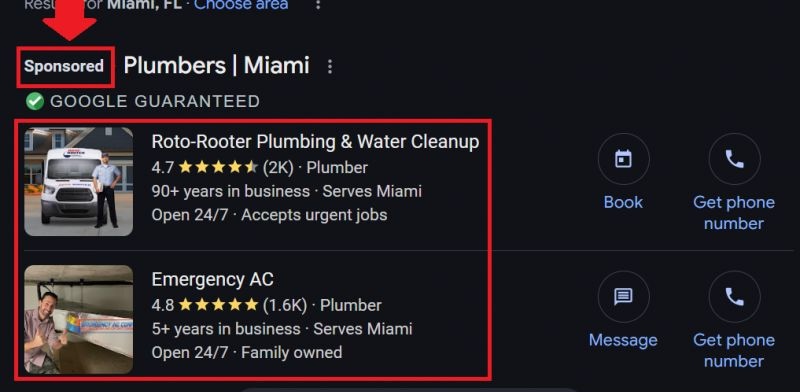
After recording all the businesses running ads at the top of your list, look at online directories. Local directories like Angie’s and Yelp are a great place to find more businesses that may be interested in your website traffic.
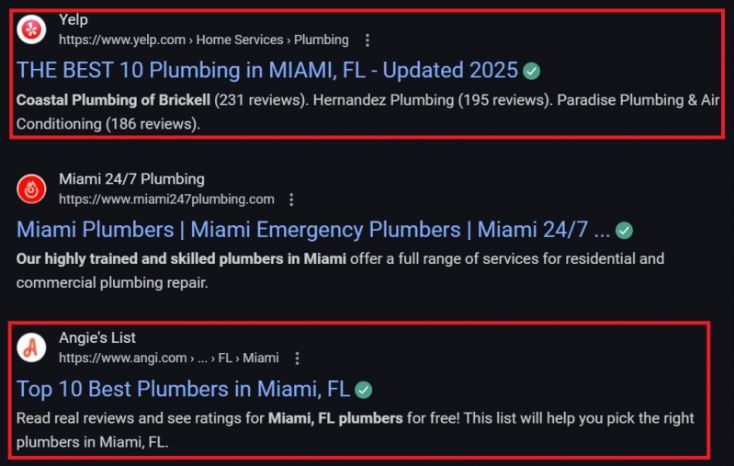
Finally, look at the businesses already ranking on the first page of Google. These should be at the bottom of your prospect list because they are already getting organic visibility on the first page of Google. This includes the businesses listed in the Google local pack and the first page organic results. Although it’s still possible to partner with one of these business owners, it’s just not as likely they will find value in the offer. Still, there are plenty of business owners that will take quality leads regardless of the marketing channel.
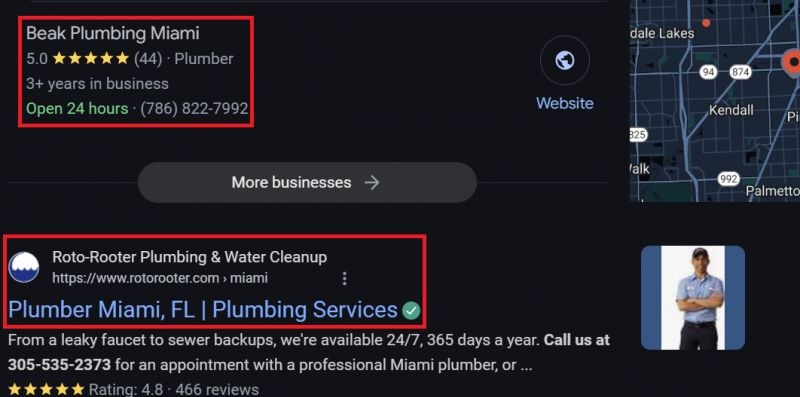
Now you have a list of business owner prospects from your niche operating in the location where your website is ranking on Google. Go down the list contacting each of these business owners. Cold calling is much more effective than cold email. Offer to send them some of your leads on a risk-free trial. Once you find an interested business owner who has successfully received some of your leads, coordinate a compensation agreement. Typically, a business owner will pay $500 - $3,000/month to rent a digital property that generates leads.
8. Scale by Investing in Additional Units
You create a digital real estate portfolio by setting up a network of digital properties. There’s no limit to the number of websites you can create. Once a website ranks on Google and you get a client to pay you, you can experience periods of passive income with this business model. You can use that extra time to build more websites to scale your revenue. I’ve scaled my business to over $50K/month. Another digital landlord, James Dooley, has scaled his digital real estate business to hundreds of thousands of dollars a month.
3 Ways To Make Money as a Digital Landlord
1. Rank and rent - Ranking a website on Google and renting it to a relevant business who can generate revenue from the traffic. This is the model highlighted in this article. Specifically, I teach you how to become a digital landlord using the local lead generation rank and rent model. However, you can also rank a website on the first page of Google for an international keyword with high volume and rent it to a business. For example, ranking a website for the term “best protein powders” and then renting protein brands sections on your listicle. This model is much higher competition than the local lead generation model, though.
2. Niche sites - Creating niche content to attract an interested audience. These sites can be monetized through ad networks like Google AdSense, affiliate marketing, selling sponsored posts, and selling Ecommerce products. For instance, the niche site Epic Gardening (epicgardening.com) publishes gardening articles and sells seeds, garden beds, live plants, and more.
3. Directory websites - Online platforms that organize and display information about businesses from a specific niche. These websites can make money through methods like selling premium listing space to business owners and selling leads. Clutch (clutch.com) is an example of a successful directory website. Clutch is a website directory for online business services like digital marketing agencies. It generates income primarily through selling premium ad space on the platform.
Is Digital Real Estate Legit?
Yes, digital real estate is legit . I have been making money online with this business model for over 10 years. Many other reputable online entrepreneurs like Matt Diggity and Gael Breton make money with digital real estate. The business model is completely legal when done right. For example, avoiding niches that require licensing if you don’t have it.
Digital real estate is risky. Like any business model, you can lose money. However, digital real estate is much less risky than most other business models. You only need to risk a few hundred or thousand dollars. That’s in contrast to investing in physical real estate, where you need to risk hundreds of thousands of dollars.
3 Digital Real Estate Investing for Beginners Tips
Digital real estate investing for beginner tips are:
1. Diversify your portfolio - Don’t just build one website and hope the model works. Build at least 10 websites to start, experimenting with different niches and locations. Find what works for you and iterate from there.
2. Commit to sales - Building the websites is the easy part for most people. Selling the website to business owners is what most people struggle with. Set aside a block of time each day to cold call business owners and prospect for opportunities.
3. Focus on relationship building - Work with business owners to create a solution that is mutually beneficial to both parties. Satisfied business owners are more likely to stick with you long term. Building solid relationships with clients allows you to expand your operations together by targeting more local keywords in the service area.
Conclusion: Should You Take a Digital Landlord Course?
You should take a digital landlord course if you’re serious about generating online income. A course provides a step-by-step system for achieving success. Our digital landlord course specifically includes access to a massive group of over 7.5K students and bi-weekly live coaching calls that cover the latest SEO and sales strategies.
I attribute my success in digital real estate to purchasing this course over a decade ago. Although I’m one of the main coaches these days, I didn’t know anything about digital real estate when getting started. This course and the community guided me to earn tens of thousands of dollars per month online in just a few short years.
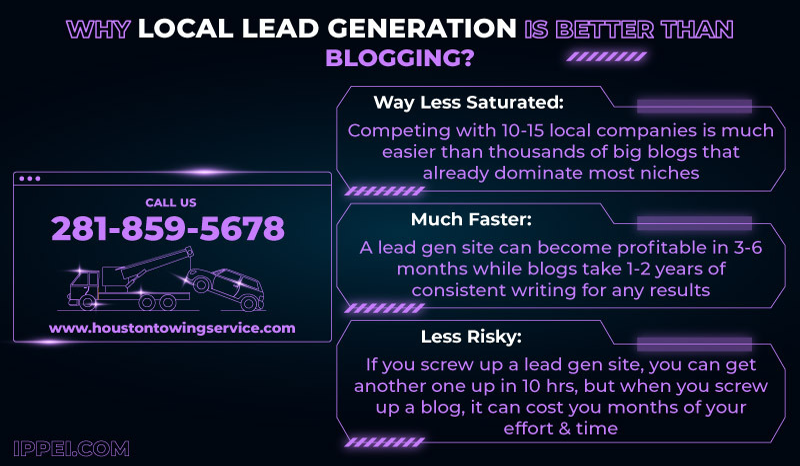
It’s not just about high-quality learning materials. The connections I made with other people on the same mission and the live mentorship from real digital landlords is what made the difference. These people kept me motivated and aware of what was possible if I just stayed consistent with digital real estate.

Follow Me
Ippei Kanehara
Founder/CEO
$52K per month providing lead generation services to small businesses
Ippei.com is for digital hustlers, industry leaders and online business owners.
His #1 online business recommendation in 2024, is to build your own lead generation business.
